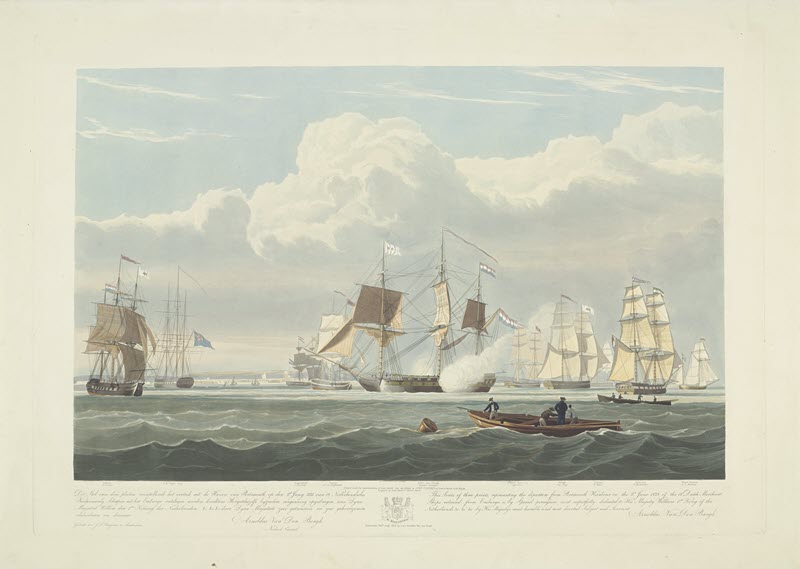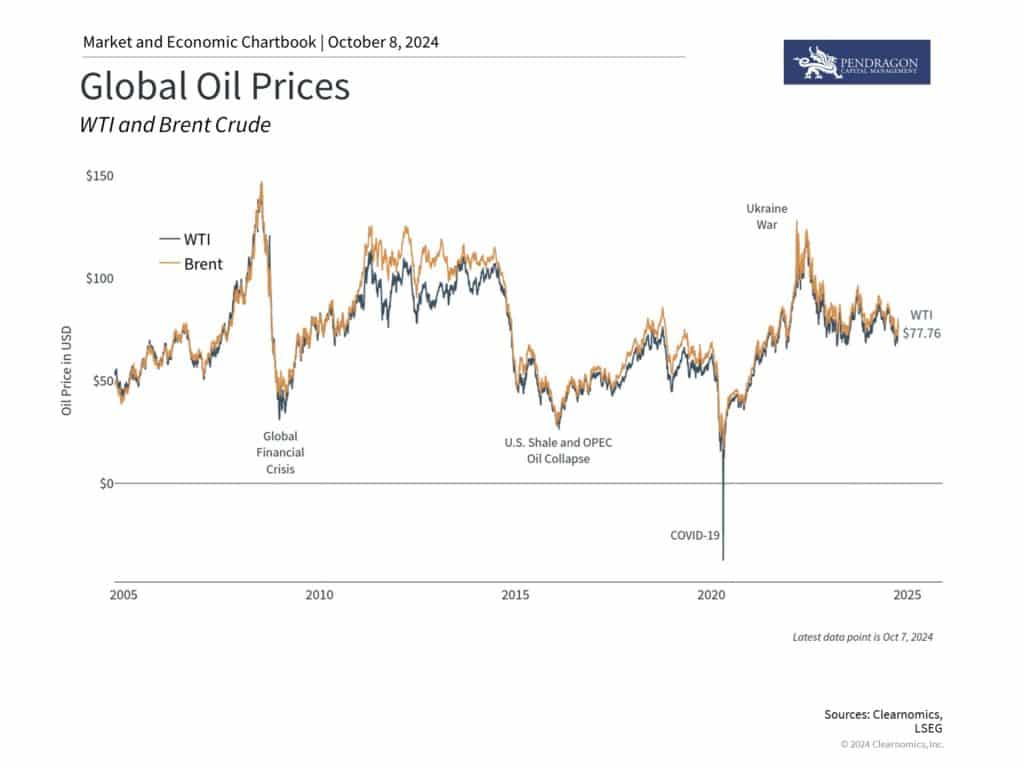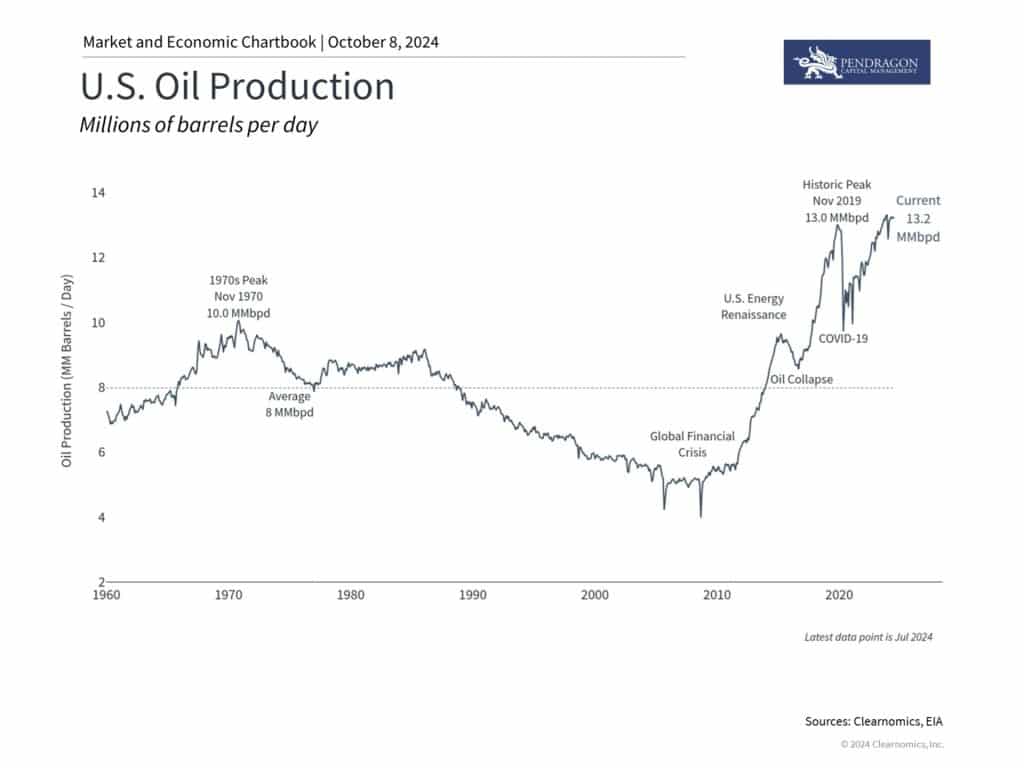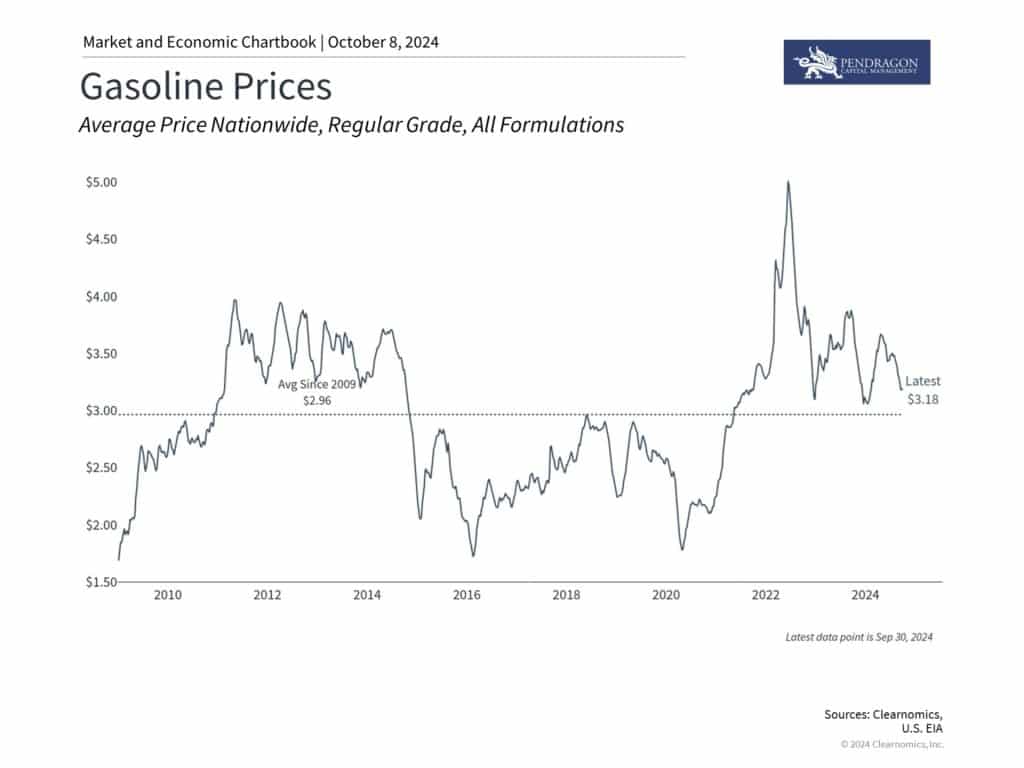Rising oil prices tend to conjure frightening thoughts: rampant inflation, and rising transportation and energy costs. You might even flashback to the 1973 Arab oil embargo and how it led to severe gasoline shortages…
Yet, rising oil prices can also be a natural byproduct of healthy growing economies.

Middle East Conflict and Oil Prices
With conflict in the Middle East and the role of oil prices on inflation expectations, investors have been analyzing the impact of oil prices on the economy and stock prices.
>> How Middle East Conflicts Have Historically Impacted Markets
Many have drawn similarities between today’s headlines and the oil shocks of the 1970s. The world economy today, in many ways, differs significantly from the 1970s.
- For one, it’s much less reliant on oil.
- We are now in a service economy rather than an industrial goods economy.
- Another is that the US and other countries, through fracking and other technologies, produces more oil than in the 1970s.
Investors need to sift through the data to see if the recent rise in crude is a temporary phenomenon or the first leg in a longer move higher.
Having said that, oil prices do play an important role in the global economy, directly influencing the cost of gasoline at the pump and indirectly impacting the prices of all goods and services. The price of oil has been an influential factor on global markets and inflation trends over the past few years. Historically, the relationship between oil and the economy is a two-way street: low or stable oil prices stimulate the economy, and a growing economy increases the oil demand, and vice versa.
Oil is Sensitive to Geopolitics and Economic Growth

Although prices have fallen from their 2022 high, they have risen amid a spike in geopolitical tensions and the potential risk to oil supply. The escalating conflict in the Middle East, which began a year ago with Hamas’s October 7 attack on Israel, is concerning and has significant humanitarian consequences.
While acknowledging the human side of the conflict, some investors may wonder what trends in oil prices may mean for their portfolios and the broader economy in the coming months.
The Price of Brend Crude
The price of Brent crude, the global oil benchmark, recently jumped to $78 per barrel due to the conflict between Israel and Hezbollah/Iran. While this represents a 13% increase from the recent low of $69 a month ago, oil prices are still roughly flat on the year and far below the 2022 peak of nearly $128.
Oil prices can be volatile and difficult to predict, but fears that the conflict in the Middle East would send prices skyrocketing above $100 a barrel have so far not materialized.
Geopolitics vs. Rapid Growth
Historically, both geopolitics and economic growth affect oil prices. While conflicts can cause prices to spike, as they did when Russia invaded Ukraine, sustained increases in oil prices have more often been the result of rising demand due to strong economic growth.
The historic level of oil prices during the mid-2000s, for instance, resulted from rapid global growth prior to the 2008 housing crash and global financial crisis. Thus, geopolitics and growth tend to impact supply and demand, respectively, which can affect how long prices stay high and the resulting effects.
The World’s Largest Producer of Oil and Gas: The United States

One reason the distinction between supply and demand-driven shocks matters is because oil producers can respond to changing prices. Unlike in the mid-2000s, the U.S. is now the world’s largest producer of crude oil. Advancements in exploration and drilling have increased output, allowing the industry to maintain high productivity levels. According to the Energy Information Administration, these improvements have been key to sustaining U.S. oil production growth which now exceeds 13.2 million barrels per day.
The U.S. as Swing Oil Producer
In theory, this means that the U.S. can play the role of “swing producer” to increase supply when oil prices are high.
Of course, this is an oversimplification since the U.S. still relies on foreign imports due to the different types of crude oil needed by refineries as well as the effects of various energy policies. Nonetheless, it helps to insulate the U.S. from geopolitics and possibly reduces the impact of oil shocks.
Oil Production Will Soon Outstrip Demand
In the long run, world oil production should outstrip demand over the next several years, according to the International Energy Agency.
This is partly due to U.S. production, but it also reflects the changing dynamics of OPEC+. The group has extended production cuts into 2025 to maintain higher oil prices, although the incentives to renege on these commitments to gain market share are high among member countries. This has made the cartel less relevant over the past decade.
Oil Remains a Transmission Mechanism for Geopolitical Tension
Despite these trends and the growing adoption of renewable energy sources, the world remains
heavily reliant on oil, which means that it still serves as a transmission mechanism for geopolitical
tension to influence the global economy.
A further spike in oil prices could act as a headwind to the economy and the “soft landing” the Fed is hoping to achieve. At the same time, many factors make this less likely than in the past.
Gasoline Prices Remain Relatively Low

That said, gasoline prices remain relatively low. Perhaps the biggest impact of higher oil prices on everyday consumers is via gasoline prices at the pump.
Fortunately, gasoline prices remain far lower than their peak in 2022 when the average price per gallon of regular unleaded reached $5. This led the Department of Energy to begin releasing oil from the Strategic Petroleum Reserve (SPR), an emergency supply of crude maintained by the government.
Since then, the government has been refilling the SPR at more attractive prices. Higher gasoline prices are effectively a tax on households and consumers since driving to work, and school, and buying groceries are necessities.
Higher gas prices also reduce disposable income for other purchases, especially larger discretionary items, which can impact retail sales and corporate earnings.
Navigating Fluctuations in Oil Prices is Challenging!
From an investment perspective, navigating oil price fluctuations can be challenging especially if they result from uncertain or troubling geopolitical developments.
The performance of the energy sector during periods of market stress illustrates this point. In 2022, when the broader S&P 500 index was down 18% and most sectors posted negative returns, the energy sector delivered a remarkable 66% gain. This followed a 55% return in 2021 for the sector when the economy roared back after the pandemic.
While past performance does not guarantee future results, maintaining a diversified portfolio that includes many sectors, including energy, can help investors offset the volatility resulting from rising oil prices.
In the long run, holding a portfolio that can weather market swings allows investors to stay focused on their long-term financial goals.
The Bottom Line on Rising Oil Prices?
Oil prices have risen due to Middle East tensions but remain well below their recent peaks. While oil can impact economic growth, investors should focus on maintaining broad sector exposures in their portfolios and avoid overreacting to daily headlines.
Let’s have a conversation. Pendragon Capital Management can help you with financial planning, retirement planning, and investing. We have tools that combined with Pendragon’s experience, will take the stress out of investment planning.
Thanks for reading. Don’t hesitate to reach out with questions.
>> Schedule a Free Consultation with Pendragon Capital Management <<
Notes:
This blog article is intended for general informational purposes only. Nothing in it should be construed as, and may not be used in connection with, an offer to sell, or a solicitation of an offer to buy or hold, an interest in any security or investment product. Investing involves risk.
Image credit: Vertrek van twaalf Nederlandse koopvaardijschepen uit de haven van Portsmouth, 1833 (plaat 3). Dit stel van drie platen voorstellende het vetrek uit de Haven van Portsmouth op den 2.d Juny 1833 van 12 Nederlandsche Koopvaardy Scheepen uit uit Embargo ontslagen (…) / This Series of three prints representing the departure from Portsmouth (…) (series title on object). Robert Havell (II), after John Christian Schetky, 1835, etching, h 521mm × w 760mm. More details
Copyright (c) 2024 Clearnomics, Inc. All rights reserved.
The information contained herein has been obtained from sources believed to be reliable, but is not necessarily complete and its accuracy cannot be guaranteed. No representation or warranty, express or implied, is made as to the fairness, accuracy, completeness, or correctness of the information and opinions contained herein. The views and the other information provided are subject to change without notice. All
reports posted on or via www.clearnomics.com or any affiliated websites, applications, or services are issued without regard to the specific investment objectives, financial situation, or particular needs of any specific recipient and are not to be construed as a solicitation or an offer to buy or sell any securities or related financial instruments. Past performance is not necessarily a guide to future results. Company fundamentals and earnings may be mentioned occasionally, but should not be construed as a recommendation to buy, sell, or hold the company’s stock.
Predictions, forecasts, and estimates for any and all markets should not be construed as recommendations to buy, sell, or hold any security–including mutual funds, futures contracts, exchange-traded funds, or any similar instruments. The text, images, and other materials contained or displayed in this report are proprietary to Clearnomics, Inc. and constitute valuable intellectual property.
All unauthorized reproduction or other use of material from Clearnomics, Inc. shall be deemed willful infringement(s) of this copyright and other proprietary and intellectual property rights, including but not limited to, rights of privacy. Clearnomics, Inc. expressly reserves all rights in connection with its intellectual property, including without limitation the right to block the transfer of its products and services and/or to track usage thereof, through electronic tracking technology, and all other lawful means, now known or hereafter devised. Clearnomics, Inc. reserves the right, without further notice, to pursue to the fullest extent allowed by the law any and all criminal and civil remedies for the violation of its rights.